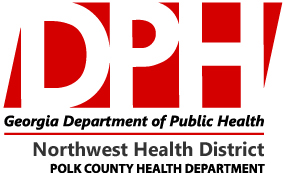MEDIA RELEASE
Cedartown, GA: A raccoon found south of Cedartown in the Wilson Road area has tested positive for animal rabies. Public health officials are reminding Polk County residents about the potential dangers of rabies and emphasizing that animal rabies can be found throughout Polk County.
“Rabies is regularly found in Polk County and is always circulating in our wild animal population,” says the Polk County Health Department’s Environmental Health Manager Kathy Couey-Miller. This is the first confirmed animal rabies case in Polk County for 2018. Polk County had three animal rabies cases in 2017, all of which were raccoons, and nine cases in 2016 – eight raccoons and a bat.
Couey-Miller urges residents to make sure their pets are vaccinated against the potentially deadly disease. “Getting your pet vaccinated against rabies is the single best way to protect your pet from rabies,” Couey-Miller says. “It’s important to do it for their protection, for our protection, and because it’s state law.”
She also cautions residents to avoid wild, stray, and possibly unvaccinated animals that may be infected with rabies to protect themselves and their families. “Reducing the risk of rabies in domestic animals and limiting human contact with wild animals are two measures central to the prevention of human rabies,” explains Couey-Miller.
Other effective precautions against rabies include:
- Vaccinate all dogs, cats and ferrets against rabies. Check with your veterinarian to make sure your pets have up-to-date protection against rabies. Remember that the vaccination of pets against rabies protects not only the pets, but more importantly, protects people.
- Don’t leave pet food out where wild animals can access it. Leaving pet food out is a sure way of getting wild animals to visit your home endangering you, your family and your pets.
- Remind children to avoid animals they don’t recognize, especially
stray or wild animals. These animals may be infected with rabies.
- Small children should not be left unattended with dogs, even if the dog is a pet or the child is familiar with it.
- Keep pets at home. Obey any county laws requiring that dogs be restrained to the owner’s property. Pets that are kept close to home are less likely to encounter a rabid animal.
- Report any raccoon, fox, bat or skunk that is out during the day in a residential area or that is behaving strangely to the local Georgia Department of Natural Resources Game and Fish Division office at 1-800-241-4113.
- Report stray dogs and cats and aggressive or sick-appearing animals to the local animal-control office.
- Don’t attempt to assist injured or sick animals without professional help. Even animals which would never bite otherwise can bite when sick or in pain.
- Bats found in sleeping quarters should be captured and tested for rabies even when there is no evidence of a bite wound or contact with the sleeping individuals.
- After-hours calls involving aggressive animals should be directed to 911.
- After-hours calls involving animal bites and their potential for rabies exposure should be directed to 866-PUB-HLTH (866-782-4584).
Polk County residents can contact the Polk County Health Department’s Environmental Health Office in Cedartown at 770-749-2253 for additional information or with any questions or concerns.
Residents can also visit the Northwest Georgia Public Health website at https://nwgapublichealth.org/environmental-health/rabies for information on animal rabies and rabies precautions. Residents can also visit http://www.cdc.gov/rabies/ for comprehensive rabies information.

